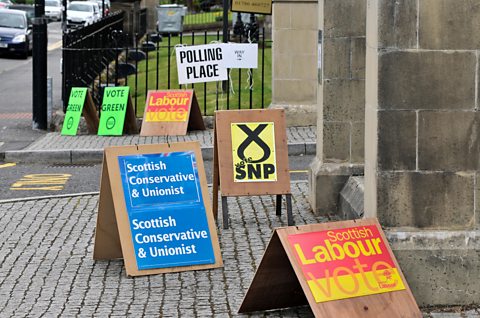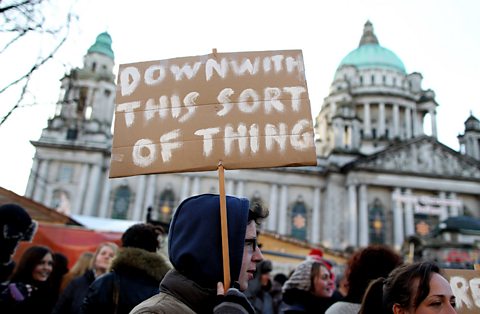Overview of political participation in Scotland
 Image source, Andrew Steven Graham / Alamy
Image source, Andrew Steven Graham / AlamyThere are three parts to the Participation section of National 5 Modern Studies:
- rights and responsibilities of individuals
- opportunities for individuals
- elections and campaigning (role of individuals, political parties and the media)
Look through this article for a quick guide to these areas, or to revise what you have already learned.
Click on the links to get more detailed information on each section.
 Image source, Andrew Steven Graham / Alamy
Image source, Andrew Steven Graham / AlamyWhat are the rights and responsibilities of people in Scotland?
The UK has signed up to the United Nations' Universal Declaration of Human Rights.
- this affects both reserved and devolved matters
- Scottish institutions have to consider international human rights when making decisions on devolved matters
In Scotland (and the UK) our human rights are protected by the Human Rights Act 1998.
- individuals who feel their rights have been breached can take a case to Scots and UK courts
- public bodies must work to uphold individuals' rights
- new laws passed by the Scottish Parliament must comply with the act
The rights people in Scotland have are balanced by responsibilities to ensure that other people's rights are upheld.
| Rights | Responsibilities |
|---|---|
| right to vote | accept the result of democratic elections |
| right to freedom of speech | refrain from using hateful or derogatory language about an individual or group in society |
| right to protest | keep within the law, avoid violence or intimidation and protest using peaceful methods |
| freedom of association | pay membership fees and do not damage the group's name through poor language or behaviour |
Find out more detail about the rights and responsibilities of people in Scotland
How can individuals participate in politics in Scotland?
Individuals have many ways to participate in democratic political life. All have benefits and limits.
| method | benefit | limit |
|---|---|---|
| vote | direct say in who represents you | you may be outnumbered by other voters |
| express opinion | easy to give views in person/on social media | may reach limited audience |
| petition | all petitions on Scottish Parliament's petition site considered | can only affect devolved matters |
| protest | may have influence through numbers involved | can only influence decision makers, not make direct change |
| join political group | can work with others towards common goals | individual power could be limited and may have to accept overall party/group position |
| stand as a candidate | if elected can be directly involved in decision making | need to win enough votes for election |
Find out more detail about the opportunities for individuals to participate in politics in Scotland
Participation in elections and campaigns in Scotland
Individuals can participate in elections by:
- voting - anyone aged 16 or over can vote in elections to the Scottish Parliament and local councils in Scotland
- staying informed - being aware of issues helps people decide who to vote for
- supporting a candidate - displaying posters, delivering leaflets and canvassing door-to-door
- standing as a candidate - people can stand as a party candidate or independent candidate
Political parties can participate in elections by:
- producing a manifesto - a manifesto outlines policies and plans for government, letting people know what they are voting for
- campaigning - canvassing, leafleting and holding public meetings and events help a party spread its message
- engaging with the media - coverage on TV, radio, social media and newspapers help parties reach the wider public
Media can participate in elections by:
- informing - telling voters about parties and issues, and covering events of the election and campaigns themselves
- holding to account - questioning candidates and parties on their policies and ability to deliver
- influence
- TV and radio must remain neutral
- newspapers and social media can take political sides and attempt to sway how people vote
Find out more detail about how individuals, parties and media participate in elections
More on Democracy in Scotland
Find out more by working through a topic
- count9 of 18
